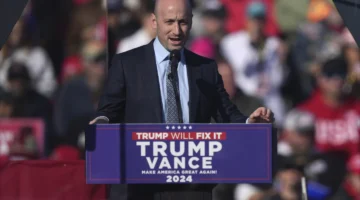Florida laws on texting while driving, hemp take effect
By ADRIANA GOMEZ LICON Associated Press
MIAMI (AP) — Many of the bills passed by the Florida Legislature will go into effect Monday, impacting drivers, students, patients and immigrants across the state.
Motorists can be stopped for texting and no other offense, but will only be warned for now. Thousands of low- and middle-income students can start enrolling in voucher programs to attend private and religious schools. Vaping indoors is no longer allowed, and local law enforcement agencies are now required to obey federal immigration authorities’ orders to further detain certain immigrants.
A new fiscal year also begins Monday with a nearly $91 billion budget that increases money for education and the environment.
On Monday, Florida will become one of the last states to make texting while driving a primary traffic violation under a new law . The measure also bans the use of any handheld wireless communications devices in school and construction zones. Before the measure, officers could only cite drivers for texting if they were pulled over for another traffic offense.
A first offense for driving while texting will be punishable by a $30 fine, with a second offense costing $60. Court costs and fees would apply, and points will be added to licenses. Only warnings will be given until January, when officers can begin writing citations.
Florida students also will see changes starting this week with a new law. Up to 18,000 of them can enroll in the $130 million Family Empowerment Scholarship , which marked one of the largest expansions of private-school voucher program in the state’s history. It is intended for families with an annual income at 300% of federal poverty guidelines, which means those making no more than $77,250 for a family of four.
Proponents of the measure say the program gives parents more choices for their children in districts where local public schools are failing, while critics say it will strip away money from cash-strapped public schools.
A new law regarding so-called sanctuary cities can impact hundreds of thousands of immigrants who are in the custody of local law enforcement. The law requires local governments to honor Immigration and Customs Enforcement detainers for immigrants who are suspected of being in the country illegally and have been arrested or convicted of a crime. It exempts crime victims and witnesses.
People who opposed the measure say the law was a politically motivated and will increase anti-immigrant sentiment. The state has the nation’s third-largest population of immigrants who are in the country illegally at about 825,000 people, according to the Pew Research Center. A portion of this new law giving power to the state attorney general to sue to force compliance goes into effect on Oct. 1.
There are two new laws set to take effect Monday but both require the federal government’s approval for implementation.
One of them creates an agricultural hemp program . Known for its oranges, Florida wanted to position itself as a national leader in agricultural hemp after a federal farm bill passed in 2018, giving states the opportunity to develop their own industry. The U.S. Agriculture Department has to review and approve program submissions.
Hemp is related to marijuana but only has trace amounts of THC, the chemical that makes people high. It has a wide range of uses, from ropes and clothing to building materials and animal feed.
The other law would give Floridians access to cheaper prescription drugs by creating two programs to import drugs from Canada and from other countries that have not been specified. The plan needs to be approved by the U.S. Health and Human Services Department.









No Comment